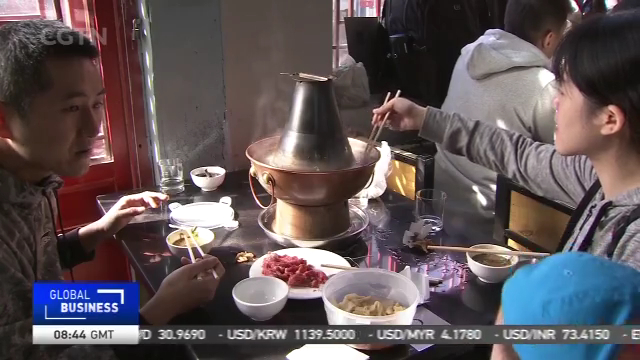
20:09, 29-Oct-2018
Trailblazers in Reform: Peking hot pot in changing times
Updated
19:26, 01-Nov-2018
05:13

It's been 40 years since China first introduced its reform and opening up policy. The move has helped countless private businesses thrive in the ensuing years, including many in the restaurant sector. Restaurants these days have largely advanced from labor intensive to capital intensive operations. But there are some that still stick to traditional values. Xia Cheng caught up with the owners of a traditional Peking halal hot pot restaurant in Beijing to learn more.
A tiny and hidden Peking hotpot place with only 10 tables and a simple menu that hasn't changed much in 30 years.
This is Laojin Peking Hotpot, a local favorite in the Tianqiao neighborhood in Beijing.
Reservations are a must because the place is small, and the fresh hand-cut lamb is on limited offer.
That attention to detail is what separates this place from the big restaurant chains that generally usually use frozen lamb.
It also requires the skill to pick the right meat and prepare it in a proper manner.
The owner, Jin Fucheng, or Laojin as locals call him, is now 84 years old.
His restaurant was one of the first privately owned businesses in China back in the 80s when most businesses were state-run.
He said he was one of the bold ones.
JIN FUCHENG, OWNER TIANQIAO LAOJIN PEKING HOT POT "In the beginning, many people were still afraid of being put on the spot for being capitalistic. I was an apprentice at Nan Lai Shun, a major halal Peking restaurant that's famous for lamb hot pot. I thought I had to promote this traditional dish. My two sifus, who treated me like a brother, supported my idea, and helped me start this hot pot restaurant in the 80s."
XIA CHENG CGTN "What's the secret ingredients to keep the restaurant alive?"
JIN FUCHENG, OWNER TIANQIAO LAOJIN PEKING HOT POT "I run a small business. Small business is based on honesty. We never say we sell the best lamb or force our customers to order more. We want them to see for themselves. If our lamb is indeed that good, they will tell others, so will they if our lamb is not so good. It's a business of reputation. Now we have customers from Shanghai and even Taipei."
Forty years have passed since the beginning of China's reform and opening up campaign.
Now, China's hot pot scene is sizzling.
Restaurant chains are going big and going public.
Haidilao is one of the most popular hotpot chains in China and it went public late last month in Hong Kong with a 12 billion US dollar valuation.
Its rival, Xiabuxiabu, has enjoyed a three-fold increase in its share price since listing four years ago.
But the thought of expansion worries Laojin.
JIN FUCHENG, OWNER TIANQIAO LAOJIN PEKING HOT POT "We have thought of scaling up. But the challenge is how to maintain the quality of our food, wherever we open new restaurants. The biggest risk is that new franchises might not catch up with the quality."
XIA CHENG CGTN "Some of the skills are key to your business. For example, picking the right meat and your unique way of slicing a lamb. How are you planning to teach others about these skills?"
JIN FUCHENG, OWNER TIANQIAO LAOJIN PEKING HOT POT "Those culinary skills are not something too tricky. But it takes years to master. My son learned them well. When I was an apprentice at Nan Lai Shun, students were close to their sifus. That's why my sifu was willing to teach me anything. Now, people are after quick profits. They learn a little, then it's all about business interests. That's why when I try their food, it doesn't taste right."
Laojin believes THAT is making it costly to pass on the secret ingredients that make Peking food special. He thinks that the authenticity of the cuisine is at risk.
Laojin's son, Jin Tao, shares his father's concern.
JIN TAO, OWNER TIANQIAO LAOJIN PEKING HOT POT "The biggest worry is inheritance. I think the more people learn and pass on those traditional culinary skills, the better those skills will be protected and inherited. If only a small group of people takes control, then less people would get to learn them. My father has other unique culinary knowledge that he wants to teach those who are interested, for free even."
Jin Tao believes that authentic food cannot be mass produced without compromising the quality.
JIN TAO OWNER OF TIANQIAO LAOJIN PEKING HOT POT "We are not going to largely promote us online or do food delivery. Because it takes a lot of work to keep our meat fresh and hand-cut, we can only produce enough food for eat-in diners. We have to make sure they are prioritized or we lose our core customers. Also, we keep our profit margin at only around 40 percent, which is considered thin, so that more people around the neighborhood can afford to enjoy the authentic lamb hot pot."
So, what does it take to make a hot pot meal authentically Beijing?
JIN FUCHENG, OWNER TIANQIAO LAOJIN PEKING HOTPOT "It's good that we are in the old neighborhood, with the real Beijing vibe. Our restaurant looks humble, but the food is authentic, something many luxury restaurants cannot offer. Look at those old Peking restaurants that have been there for decades, they are all humble and hidden deeply in hutongs or courtyards. That's what makes diners feel like home."
And who doesn't like food that tastes like home, no matter how the times change.
XIA CHENG, CGTN, BEIJING.

SITEMAP
Copyright © 2018 CGTN. Beijing ICP prepared NO.16065310-3
Copyright © 2018 CGTN. Beijing ICP prepared NO.16065310-3